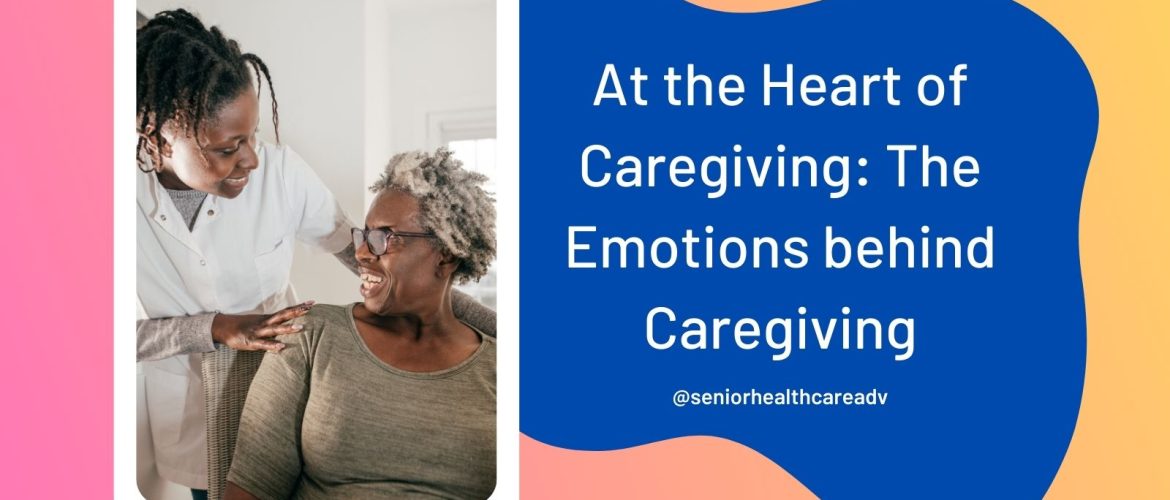At the Heart of Caregiving:
The Emotions Behind Caregiving
If you become a caregiver all of the sudden, whether it is by default or willingly, a plethora of emotions may arise once you take on the challenge of caregiving.
Some of these emotions may happen immediately and some don’t arise until you have been “on the job” for a while. Whatever situation you find yourself in, it is imperative that you remember that you too are important. When it comes to caregiving, all of your feelings, bad, good, or in between, are not only allowed but important and valid.
“This is my Mom or my Dad, I will never wear out taking care of them.”
But, as time goes on some ‘negative’ feelings about what we want and the feelings we may suppress become more evident; Some caregivers may often feel as though they are living in worry of being judged by others or even by ourselves. Caregivers are very often reluctant to talk about these negative emotions because they don’t want to be a burden to others with their issues.
If you “stuff” all of your feelings away as an act of avoidance, they can start acting like a toddler who is begging for your attention. Emotions often tend to keep tugging at you until you stop and notice them. If you still don’t pay attention to your emotions they can accumulate and cause an array of physical and mental health issues, such as insomnia, gastrointestinal problems, stress eating, depression, anxiety, and the list goes on. Eventually, you may be unable to handle your duties as a caregiver.

Ambivalence
This emotion is one of feeling like you want to do something, but you really don’t have the energy or drive to do it. On the not-so-good days, you may feel like you don’t even want to be in your predicament and hope the whole ordeal will be over. On a good day, you may feel like you have been given the gift of giving. Caring for another person is one of the greatest feelings you can ever experience.
Coping: This is a feeling where you allow yourself to feel both sets of feelings at the same time. We can all have these feelings on any given day. Neither the good nor the bad moments will last forever.
Anger
Do you ever have the feeling that you you have “lost it”? Or had a feeling like you have reached “the end of your rope”? Just know that frustration and anger are very normal aspects of caregiving. After all, being around someone who needs help “all of the time” and caring for someone who can be, at times, combative, can even be more challenging. Anger, can sometimes just come out.
Coping: First off, forgive yourself. Give yourself permission to take a “time out”. Learn to walk away and just breathe. Find a constructive manner with which you can express yourself. Find a support system where you feel comfortable talking or venting about your emotions regarding what happened that day.
Anxiety
This is a feeling where you sense things are spinning out of control and you don’t quite know how to regain it. This produces feelings of anxiousness. You may feel like crying. Your heart rate may become elevated, and tremors may set in.
Boredom
It’s not hard to find yourself bored when you are at home, or in someone’s home, taking care of their needs without doing anything to fulfill your own. Especially, if the person you are caring for sleeps for a good number of hours during the day. At the end of the day, you may find yourself too tired to do anything you are normally interested in doing.
Coping: Taking a rest yourself can be very helpful. Similar to a toddler, rest when they are resting. Taking a caregiver’s break and having a few moments for yourself to take a walk or talk to a friend on the phone will increase your resilience and patience, but will put a little extra pep in your step.
Crankiness and Irritability
When you are stressed out and tired it’s harder to keep things under control, and it is harder to control what comes out of our mouths. We may have a tendency to lash out at the smallest of things. Our feelings are on a rollercoaster.
Coping: If you find yourself cranky or irritable you most likely need a break. You may also need a quick 20 minute nap because feeling tired can make us irritable. Some people turn to junk food or alcohol to reward themselves when feeling down. You are better off practicing writing in a journal, talking to a friend, or seeking a professional life coach or therapist. You can also do some power walking if it is possible.
Depression/Sadness
Caregivers are at risk for situational depression. Watching someone in pain or showing signs of frailty may make you feel sad or depressed. Depression can leave you feeling fatigued or you may have trouble sleeping. Sometimes it can even make you tearful.
Coping: Talk to your doctor if you are feeling depressed. Join a caregivers support group or find a therapist who has an in-depth understanding of the challenges that come along with caregiving. Ask for help from a friend or family member. Moving around has been proven to relieve many of the symptoms of depression, so, by all means, exercise.

Fear
“Oh goodness, what if something goes wrong?” “Will I be able to handle it?” “I couldn’t stand the guilt!” Caregivers take on an enormous amount of responsibility, not only caring for someone on a daily basis, but also for anything that “might” go wrong while giving care. The “what-ifs” can cause paralyzing fear and can keep you from being happy during the “what-is”.
Coping: Contingency plans are a must. So having plan Bs goes a long way. Maybe you can have an on-call backup caregiver for unpredictable illnesses or bounce solutions off of when things do happen. If you find yourself in crippling fear, it is good to have someone to turn to. The fear of something going wrong is almost scarier than when it does go wrong.
Frustration
Frustration is a part of ambivalence, impatience, and anger. Often caregivers feel like they just can’t do anything right and when they are tired, they can start feeling frustrated. Frustration can lead to over-imbibing, stress eating, and a greater chance of feeling angry.
Coping: Acknowledge that caregiving can be frustrating, and follow the suggestions for how to cope with anger, fear, and irritability. Exercise, joining a support group for caregivers and practice how to cope when the feeling of frustration first arises.
Guilt
Guilt is how we feel when we know we have done something wrong. You may feel like you could have done something better for the person you are caring for. Guilt for wishing you didn’t have to do it anymore. Guilt for being grumpy or impatient. And guilt for not always showing love for your position in life. There may be tremendous guilt if the person you are caring for gets injured when in your care. Sometimes, you may even feel guilty for thinking about your needs and that you should not wish you were out to lunch with a friend.
Coping: Give yourself permission to forgive yourself. You can’t be perfect 100% of the time. It is impossible to do things perfectly or to be in control of your feelings all of the time. Ruminating about all of the “should-ofs and would-ofs” can turn your guilt into regret. You can write down three things per day that you are grateful for. Change your inner dialog. “I am doing the best I can” “I love this person and I am showing them by caring for their best interest”.
Feeling Unappreciated
Coping: Just give yourself a pat on the back. Journal about your daily activities, and once again, find a support group for caregivers.
*The information in this article is intended solely to provide general information on matters of interest for the personal use of the reader, who accepts full responsibility for its use. This article should not be used as a substitute for consultation with professional legal, medical, or other competent advisors.





